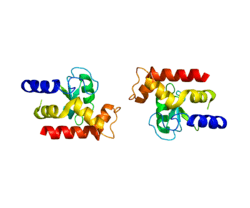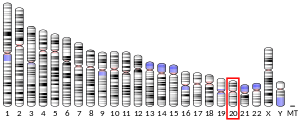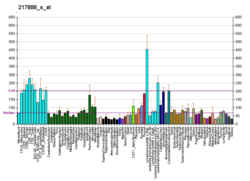ARFGAP1
ADP-ribosylation factor GTPase-activating protein 1 is an enzyme that in humans is encoded by the ARFGAP1 gene.[5][6] Two transcript variants encoding different isoforms have been found for this gene.
Function
The protein encoded by this gene is a GTPase-activating protein (GAP) which associates with the Golgi apparatus and which interacts with ADP-ribosylation factor 1 (ARF1). The encoded protein promotes hydrolysis of ARF1-bound GTP and is required for the dissociation of coat proteins from Golgi-derived membranes and vesicles. Dissociation of the coat proteins is required for the fusion of these vesicles with target compartments. The activity of this protein is stimulated by phosphoinositides and inhibited by phosphatidylcholine.[6]
The protein has two amphipathic lipid packing sensor motifs (ALPS), that let the protein sense the curvature of the membrane (<30 nm) or lipid packing defects, and in this way evaluate if the vesicle is mature and ready for coat disassembly.[7][8]
Interactions
ARFGAP1 has been shown to interact with KDELR1 and LRRK2.[9][10][11]
References
- GRCh38: Ensembl release 89: ENSG00000101199 - Ensembl, May 2017
- GRCm38: Ensembl release 89: ENSMUSG00000027575 - Ensembl, May 2017
- "Human PubMed Reference:". National Center for Biotechnology Information, U.S. National Library of Medicine.
- "Mouse PubMed Reference:". National Center for Biotechnology Information, U.S. National Library of Medicine.
- Huber I, Rotman M, Pick E, Makler V, Rothem L, Cukierman E, Cassel D (February 2001). "Expression, purification, and properties of ADP-ribosylation factor (ARF) GTPase activating protein-1". Methods in Enzymology. 329: 307–16. doi:10.1016/S0076-6879(01)29092-2. PMID 11210549.
- "Entrez Gene: ARFGAP1 ADP-ribosylation factor GTPase activating protein 1".
- Mesmin B, Drin G, Levi S, Rawet M, Cassel D, Bigay J, Antonny B (February 2007). "Two lipid-packing sensor motifs contribute to the sensitivity of ArfGAP1 to membrane curvature". Biochemistry. 46 (7): 1779–90. doi:10.1021/bi062288w. PMID 17253781.
- Antonny B (June 2011). "Mechanisms of membrane curvature sensing". Annual Review of Biochemistry. 80: 101–23. doi:10.1146/annurev-biochem-052809-155121. PMID 21438688.
- Aoe T, Cukierman E, Lee A, Cassel D, Peters PJ, Hsu VW (December 1997). "The KDEL receptor, ERD2, regulates intracellular traffic by recruiting a GTPase-activating protein for ARF1". The EMBO Journal. 16 (24): 7305–16. doi:10.1093/emboj/16.24.7305. PMC 1170331. PMID 9405360.
- Majoul I, Straub M, Hell SW, Duden R, Söling HD (July 2001). "KDEL-cargo regulates interactions between proteins involved in COPI vesicle traffic: measurements in living cells using FRET". Developmental Cell. 1 (1): 139–53. doi:10.1016/S1534-5807(01)00004-1. PMID 11703931.
- Stafa K, Trancikova A, Webber PJ, Glauser L, West AB, Moore DJ (February 2012). "GTPase activity and neuronal toxicity of Parkinson's disease-associated LRRK2 is regulated by ArfGAP1". PLoS Genetics. 8 (2): e1002526. doi:10.1371/journal.pgen.1002526. PMC 3280333. PMID 22363216.
External links
- Human ARFGAP1 genome location and ARFGAP1 gene details page in the UCSC Genome Browser.
Further reading
- Rothman JE (November 1994). "Mechanisms of intracellular protein transport". Nature. 372 (6501): 55–63. doi:10.1038/372055a0. PMID 7969419.
- Bernards A, Settleman J (July 2004). "GAP control: regulating the regulators of small GTPases". Trends in Cell Biology. 14 (7): 377–85. doi:10.1016/j.tcb.2004.05.003. PMID 15246431.
- Maruyama K, Sugano S (January 1994). "Oligo-capping: a simple method to replace the cap structure of eukaryotic mRNAs with oligoribonucleotides". Gene. 138 (1–2): 171–4. doi:10.1016/0378-1119(94)90802-8. PMID 8125298.
- Cukierman E, Huber I, Rotman M, Cassel D (December 1995). "The ARF1 GTPase-activating protein: zinc finger motif and Golgi complex localization". Science. 270 (5244): 1999–2002. doi:10.1126/science.270.5244.1999. PMID 8533093.
- Suzuki Y, Yoshitomo-Nakagawa K, Maruyama K, Suyama A, Sugano S (October 1997). "Construction and characterization of a full length-enriched and a 5'-end-enriched cDNA library". Gene. 200 (1–2): 149–56. doi:10.1016/S0378-1119(97)00411-3. PMID 9373149.
- Aoe T, Cukierman E, Lee A, Cassel D, Peters PJ, Hsu VW (December 1997). "The KDEL receptor, ERD2, regulates intracellular traffic by recruiting a GTPase-activating protein for ARF1". The EMBO Journal. 16 (24): 7305–16. doi:10.1093/emboj/16.24.7305. PMC 1170331. PMID 9405360.
- Mossessova E, Gulbis JM, Goldberg J (February 1998). "Structure of the guanine nucleotide exchange factor Sec7 domain of human arno and analysis of the interaction with ARF GTPase". Cell. 92 (3): 415–23. doi:10.1016/S0092-8674(00)80933-2. PMID 9476900.
- Huber I, Cukierman E, Rotman M, Aoe T, Hsu VW, Cassel D (September 1998). "Requirement for both the amino-terminal catalytic domain and a noncatalytic domain for in vivo activity of ADP-ribosylation factor GTPase-activating protein". The Journal of Biological Chemistry. 273 (38): 24786–91. doi:10.1074/jbc.273.38.24786. PMID 9733781.
- Zhang C, Yu Y, Zhang S, Liu M, Xing G, Wei H, Bi J, Liu X, Zhou G, Dong C, Hu Z, Zhang Y, Luo L, Wu C, Zhao S, He F (February 2000). "Characterization, chromosomal assignment, and tissue expression of a novel human gene belonging to the ARF GAP family". Genomics. 63 (3): 400–8. doi:10.1006/geno.1999.6095. PMID 10704287.
- Majoul I, Straub M, Hell SW, Duden R, Söling HD (July 2001). "KDEL-cargo regulates interactions between proteins involved in COPI vesicle traffic: measurements in living cells using FRET". Developmental Cell. 1 (1): 139–53. doi:10.1016/S1534-5807(01)00004-1. PMID 11703931.
- Yu S, Roth MG (August 2002). "Casein kinase I regulates membrane binding by ARF GAP1". Molecular Biology of the Cell. 13 (8): 2559–70. doi:10.1091/mbc.E02-04-0189. PMC 117925. PMID 12181329.
- Yang JS, Lee SY, Gao M, Bourgoin S, Randazzo PA, Premont RT, Hsu VW (October 2002). "ARFGAP1 promotes the formation of COPI vesicles, suggesting function as a component of the coat". The Journal of Cell Biology. 159 (1): 69–78. doi:10.1083/jcb.200206015. PMC 2173491. PMID 12379802.
- Beausoleil SA, Jedrychowski M, Schwartz D, Elias JE, Villén J, Li J, Cohn MA, Cantley LC, Gygi SP (August 2004). "Large-scale characterization of HeLa cell nuclear phosphoproteins". Proceedings of the National Academy of Sciences of the United States of America. 101 (33): 12130–5. doi:10.1073/pnas.0404720101. PMC 514446. PMID 15302935.





